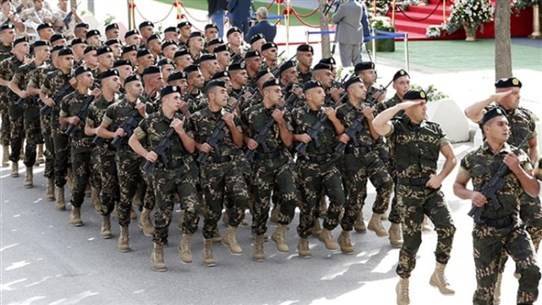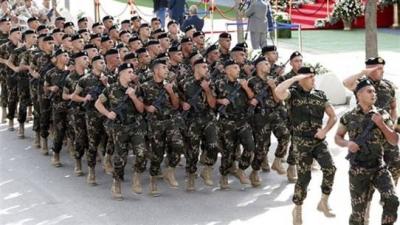Today, Lebanon celebrates its 79th Independence Day amid a presidential vacuum, a resigned government, sharp political divisions, a deteriorating economic situation, and an enemy lurking behind the southern borders. The only constant in this scene is the Lebanese Army, which unites all Lebanese under its banner. About 15 years ago, for many years, it brought youth together under mandatory military service. Could it return? This question may seem out of context amidst an unprecedented economic crisis, yet raising it evokes many sentiments.
Mandatory military service, which returned in 1993, was permanently abolished in 2007 under Law 665 issued on February 4, 2005. To date, the number of young people who served at the two camps in Wawrar in Beirut (established in 1993) and Arman in northern Lebanon (established in 1995) has reached 250,000 recruits, according to the Lebanese Army's website.
For 14 years, this service was a topic of contention among youth. Promotion for it took various forms, including songs dedicated to it, such as the one by then-rising star Wael Kfoury, who told his girlfriend and his audience, "I'm going to the army tomorrow." Conversely, those who rejected the service found ways to avoid it, leading many to pursue higher studies (the demography department at the Lebanese University saw the largest number).
The opinions of the youth today about the return of mandatory military service do not differ much from the past. Even when reminded of its importance, such as instilling discipline and order, enhancing physical fitness, acquiring military skills, fostering national upbringing, and emphasizing national belonging, most of those we surveyed do not welcome the idea of leaving their homes to join the army and live in a camp for a full year. Many feel no responsibility towards their country— "There’s an army and a resistance defending us during wartime; why should I torture myself?" says Hussein. Samer goes further, rejecting mandatory service out of contempt for "corrupt rulers," believing that "the country does not deserve our service without financial compensation, especially given the difficult economic conditions we are facing."
As some reject mandatory military service because it "contradicts the principle of freedoms and does not respect their desire not to fight on the front lines for their country or even in a reserve capacity," others are willing to offer their blood for their country but do not trust the party under which they would serve. Hassan, for example, asks, "Is the military institution truly national? Or is it working for foreign agendas?"
Conversely, some encourage the return of conscription for reasons related to "toughening" up the youth, whom they describe as a "cardboard" or "sponge" generation, also to benefit from the experiences and skills that military life develops on several levels. Jihad finds it "illogical not to have compulsory recruitment in Lebanon to strengthen our belonging to the flag and military institution." Supporters of the return of military service also praise the mixing it provides between youth from different sects. However, Raji holds a contrary view, stating that "the integration of youth and cohabitation is just folklore because one year won't change the deeply rooted sectarian reality within us."
Military life is hard. Those who served agree that military life is a difficult and harsh experience. They summarize it with limits on freedom, missing their families, reliance on themselves, and obeying officers' orders... For these reasons, some enjoyed it while others could not bear it. Ala'a, who served "under duress" in 1996, claims, "If you gave me the world, I wouldn’t go again to service." Why? "Because of the poor treatment by the officers, showing no respect for us or our freedoms, including religious freedoms." He recounts how he prayed secretly behind a tent so that the officer would not see him. He does not recall the stipend he received but confirms that he relied on "my mother, may she rest in peace, for transportation costs." He also mentions that the Airborne Brigade where he served, like the Commando Brigade, was "spoiled" and received delicious foods like chicken, molokhia, and beans.
Mohammed summarizes his 1998 service experience with the phrase: "I suffered, so I learned." He talks about the very rough treatment, having undergone a training course just after a surgical operation on his leg. "The doctor gave me a two-week sick leave, but the officer denied me for reasons I do not understand," he says. Mohammed trained on using light weapons and artillery and participated in army raids in Mansourieh to apprehend suspects. Even though "he was wiped off the earth," as he puts it, he "learned discipline, patience in tough circumstances, and self-reliance after leaving home in the prime of my youth, eating alone and washing my clothes by myself for the first time."
Fuad felt a sense of belonging to the country and the military institution as a result of his mandatory service in 1997. His sense of patriotism every time he stood at a checkpoint made the service a "pleasant experience" that he doesn't hesitate to repeat, strongly encouraging its return to "establish a national generation that serves its homeland without compensation simply because they feel patriotic." During his service, Fuad met youth from various regions and religions and "had a great time together," whom he still visits today.
Hussein Yassin: For its return, but...
After completing his university studies in media, Hussein Yassin, a correspondent for "beIN Sports" in Italy, fulfilled his national duty and served in the military, "like most of my generation, who served willingly or under duress." He describes military life as "new," teaching him lessons, but not introducing him to others, as he served in 2000 "long after the war had ended, and relations with others were established, but it acquainted me with their customs and regions since I lived with them daily. In this sense, it was a new experience." It was also a waste of time as it deprived him of continuing his work, "which I loved and found as a breathing space." Unlike some of his colleagues who continued working secretly, with the authorities turning a blind eye, that option was not available to him. "I worked in television; my job could not remain secret." Therefore, he criticizes the duration of service, stating it is "long and may waste opportunities for youth." In his opinion, it should not exceed six months, "a sufficient duration to achieve the desired goals of military service."
As for the proposal to return mandatory military service, "any patriotic person would not be against it... when the country recovers." However, at the moment, he opposes it, as "there are many essential issues that need to be resolved before thinking about military service."




